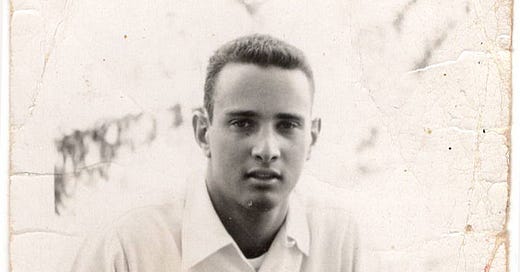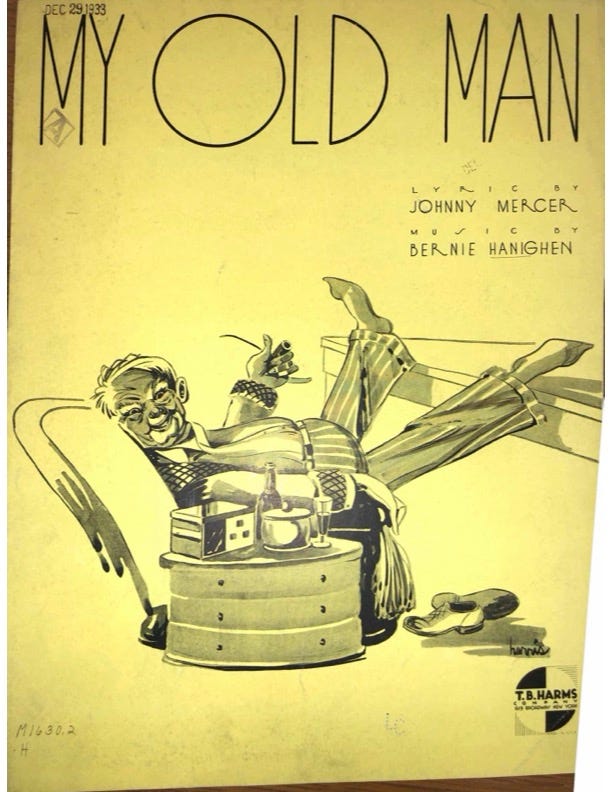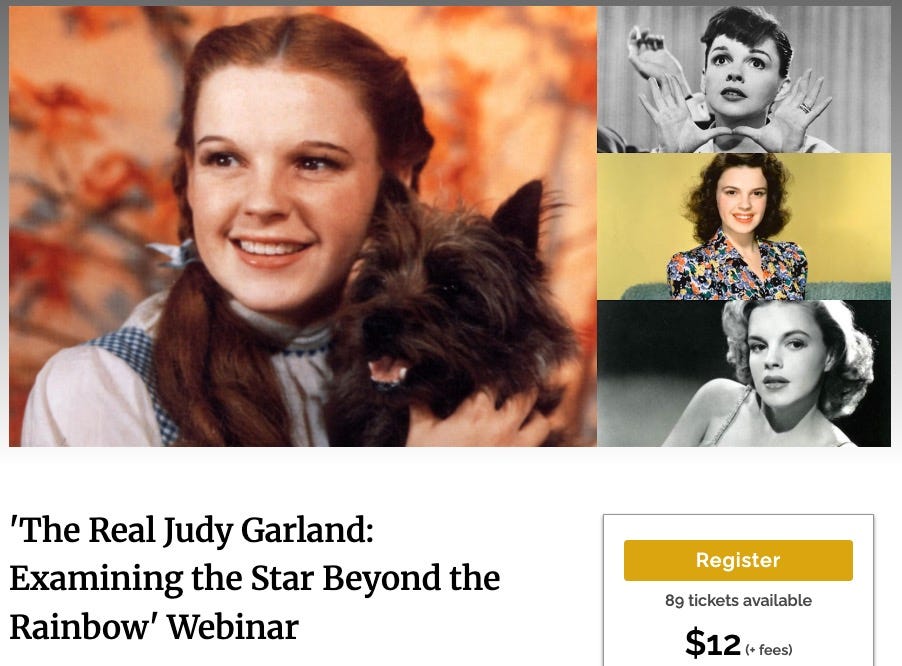My late father, Herb Friedwald (1935-1997) was a huge music buff. I mean that in multiple senses of the word: he was about 6’ 3”, which is an inch or so taller than I am. Here’s a photo of Herb in his college jock phase; the two great loves of his life were jazz and basketball. I never knew him when he looked like this. These being the days before phone cameras, I don’t think I have even one photo of my father and myself together. And below, his obituary in the New York Times, August 6, 1997 (for which I am still grateful to my old friend, Peter Watrous). “God Bless the Child That’s Got His Own.”
My Dad and I often hung out with other jazz fans and music nerds - and we never missed the annual collector’s bash, which is happening in just about one week on from Thursday evening June 19 through Saturday night June 21. I remember other collectors and assorted mega-nerds asking him about his favorite song, and he always had a different answer; at least once, he said it was “New Rubbin’ on the Darn Old Thing” by Oscar’s Chicago Swingers.
But it occurred to me more recently that the one tune we probably listened to, more than any other, was “My Old Man” by the Spirits of Rhythm, featuring the great Leo Watson. (I swear to God, I never realized until this very moment that this might be considered an ironic song for a father and son to bond over.) Here are the lyrics as sung by Leo Watson and the Spirits of Rhythm:
(recording lyrics)
My, my, my old man.
My, my, my old man.
My old man.
He only works on the one day plan.
He does nothin' on Mondays, rests till Sunday.
My old man.
My old man.
He's only doin' the best he can.
He takes a barrel of whiskey to make him frisky.
My old man.When he steps out, grabs ol’ Missy from the washing tub.
Takes her in a taxi to the Onyx Club.
With a (scat phrase) flanky-flanky doodle and an um ga ga
My old man.
He’s going to end in the garbage can.
If there’s a bottle of gin there, he’ll get in there.
My old man.
To my surprise, the official lyrics (as published in Bob Kimball’s definitive The Complete Lyrics of Johnny Mercer, are very different, are somewhat more cleaned-up, and include a verse. Clearly Bob took these from the sheet music, but I’ve never heard them sung - all three of the major 1933 recordings use the lyric above. (Although the Hal Kemp - Skinny Ennis record does include the brief verse.)
(sheet music lyrics)
Verse:
Sister Kate is cuttin’ down expenses,
Brother Gate, you don’t see him shirk.
Old Aunt Sue is losin’ all her senses,
Try’n’ to make a nickel do a dollar’s work.
Squeeze a dime
Ev’ry time
And what is the reason why?
It’s ….My old man.
He only works on the one day plan.
He does his business on Mondays, and rests till Sunday.
My old man.
Bless his heart,
He’s always tryin’ to do his part.
But when it’s time to get paid off, why, he gets laid off
My Old Man!When he steps out, grabs an old missus from the washing tub.
Takes her in a taxi to the Cotton Club.
With a (scat phrase) flanky-flanky doodle and an um ga gaMy Old Man,
He’s gonna wind up an also-ran,
He’s such a cheerful old loafer,
You’re bound to go for
My Old Man.
This is a very early song by “John” Mercer; in 1933, he was still spending more time as a band vocalist - with Paul Whiteman and others - than as a songwriter. Mercer was deeply immersed in the jazz world, as evidenced, among other things, by his early connection with Leo Watson. A few years later he would bring the pioneering scat singer and vocal improvisor onto the Camel Caravan with Benny Goodman, on which Mercer co-starred and hosted. It’s clear that Mercer knew Watson before he wrote this song; the scat phrase at the end of the bridge - flanky-flanky doodle and an um ga ga - is clearly lifted from Watson, the same way that “switcharooney” in “Satin Doll” was borrowed with permission from Slim Gailliard.
(We know Mercer loved these African-American jive-and-vocal groups that combined inspired singing with instrumental virtuosity. He was, for instance, virtually the first major music business figure to discover the King Cole Trio, just a few weeks after Nat King Cole, Oscar Moore, and Wesley Prince began playing together. The first song they recorded, in September 1938, was Mercer’s “Mutiny in the Nursery.”)
Also note that in the published lyric, “My old man” takes “ol’ missus” to the Cotton Club - in the sung lyrics, it’s the Onyx Club. The Onyx Club had been opened surreptitiously as an underground speakeasy in 1927, but it was only in 1933 - the year that this song was published and recorded - that it became a legal operation, after the election of Franklin D. Roosevelt and the Repeal of Prohibition.
At some point I should love to do both a Substack and a Sing! Sing! Sing! episode about the remarkable Bernie Hanighen, whose day job was as producer and A&R man at the American Recording Corporation (the once and future Columbia Records) in the 1930s; Billie Holiday seems to have much preferred him to the more dogmatic John Hammond. As a songwriter, Hanighen had the distinction of writing music for the words of Johnny Mercer (“The Dixieland Band,” “Bob White,” “Here Come the British,” “When a Woman Loves a Man”) as well as words for the music of Raymond Scott (as in the score to the eccentric composer’s 1946 Broadway show Lute Song), although his biggest copyright was probably the familiar lyrics to Thelonious Monk’s jazz anthem “‘Round Midnight.”
Here are the other major recordings of the song, the first being issued as “Bob Causer and his Cornellians” - which is actually the legendary Don Redman and his Orchestra, no less—an authentic Black band passing as a white band (a white college band, no less) albeit with a white vocalist, the exceptional Chick Bullock.
Hal Kemp led a first-rate dance band that was beloved in its day but alas, has been largely forgotten since. Johnny Mercer himself sang its praises, describing Kemp as “the typewriter band” (for its distinctive tucka-tucka rhythm) as did Mel Tormé, who made a point to tell me how much he enjoyed the group. Mercer’s lyric is made to order for the staccato, understated singing of drummer-vocalist Skinnay Ennis, who later started his own band and gave the great Gil Evans his first major gig as an arranger. (My great friend Bob Conrad, the world’s living authority on Hal Kemp and his Orchestra, probably has a better copy of this 78, but this one is the best I’ve found on the YouTubes.)
Virtually the only other version of the song I know about is our late friend the marvelous Sven Assmussen - I wrote a profile of him in 2010 (for The Wall Street Journal) when he released a new album at the age of 94. In addition to being one of the great violinists in the history of jazz - a true student of Stuff Smith and Joe Venuti - like the two of them, he was an inveterate entertainer, a singer, comic, and irreverent funster. His version of the Mercer-Hanighen tune is very much in the spirit of the Spirits of Rhythm. The quartet here is Svend Asmussen (violin & vibraphone), Svend Hauberg (guitar), Johan Poulsen (bass), and Erik Frederiksen (drums), all of them also singing. This “My Old Man” seems to have been recorded in the final days of the Nazi occupation of Denmark. (Svend actually told me a funny story about his encounter with the Gestapo in Copenhagen - if one can imagine such a thing.)
I’ll end with a somewhat more reverential but no less spirited song for my father, courtesy of Horace Silver, Louis Hayes, and the wonderful Gregory Porter:
(Very special thanks to Elizabeth Zimmer & Dan Fortune for their expert proofing, hey!)
Coming on Wednesday June 18 @ 7:00PM, THE NEW YORK ADVENTURE CLUB presents JUDY GARLAND: THE STAR BEYOND THE RAINBOW webinar (All presentations are available for replay viewing for one week after the live event. For more information & reservations, please click here.)
Sing! Sing! Sing! : My tagline is, “Celebrating the great jazz - and jazz-adjacent - singers, as well as the composers, lyricists, arrangers, soloists, and sidemen, who help to make them great.”
A production of KSDS heard Saturdays at 10:00 AM Pacific; 1:00 PM Eastern.
To listen to KSDS via the internet (current and recent shows are available for streaming) click here.
The whole series is also listenable on Podbean.com; click here.
SING! SING! SING!
Father's Day (“My Old Man”)
(SSS #152 2025-06-14)
download: <or> play online:
Nelson Riddle
(SSS #29 2023-01-14)
download: <or> play online:
Let's Spring One! (Sing Sing Sing goes Spring Spring Spring!)
(SSS #149 2025-05-24 - Spring 2025, Part 2)
download: <or> play online:
The Charles Strouse Jazz & Pop Mixtape (RIP 1928-2025)
(SSS #062 2023-09-02)
download: <or> play online:
Mother's Day - Mama I Wanna Make Rhythm!
(SSS #148 2025-05-17)
download: <or> play online:
Cinco de Mayo 2025 - Swinging Singers Go Latin!
(SSS #147 2025-05-10)
download: <or> play online:
SLOUCHING TOWARDS BIRDLAND is a Substack newsletter by Will Friedwald. The best way to support my work is with a paid subscription, for which I am asking either $5 a month or $50 per year. Thank you for considering. (Thanks as always to Arlen Schumer for special graphics.) Word up, peace out, go forth and sin no more! (And always remember: “A man is born, but he’s no good no how, without a song.”)
Note to friends: a lot of you respond to my Substack posts here directly to me via eMail. It’s actually a lot more beneficial to me if you go to the Substack web page and put your responses down as a “comment.” This helps me “drive traffic” and all that other social media stuff. If you look a tiny bit down from this text, you will see three buttons, one of which is “comment.” Just hit that one, hey. Thanks!j
Slouching Towards Birdland (Will Friedwald's Substack) is a reader-supported publication. To receive new posts and support my work, consider becoming a free or paid subscriber.









Will, your knowledge of music is unparalleled, but what you've written here about you and your dad is really touching. A lovely posting.
You schooled me Will! Such fun facts and background. Thanks!